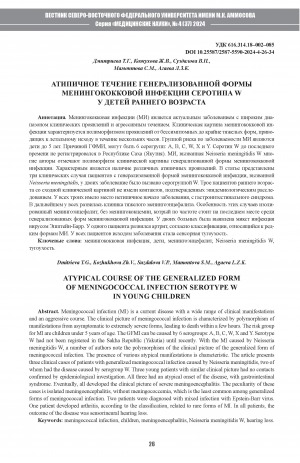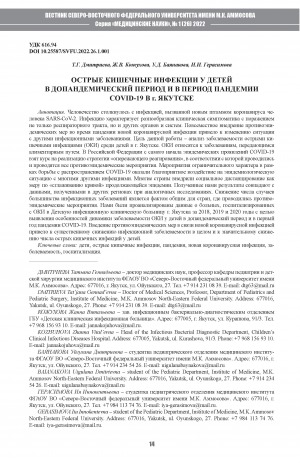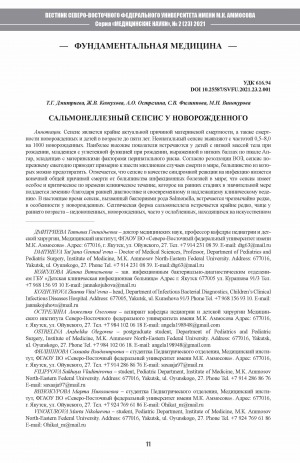Место работы автора, адрес/электронная почта: ГБУ РС(Я) "Детская клиническая инфекционная больница" ; 677005, г. Якутск, ул. Курашова 91/3 ; e-mail: jannakojuhova@mail.ru ; https://dikb.mzsakha.ru/
Количество страниц: 9 с.
Meningococcal infection (MI) is a current disease with a wide range of clinical manifestations and an aggressive course. The clinical picture of meningococcal infection is characterized by polymorphism of manifestations from asymptomatic to extremely severe forms, leading to death within a few hours. The risk group for MI are children under 5 years of age. The GFMI can be caused by 6 serogroups: A, B, C, W, X and Y. Serotype W had not been registered in the Sakha Republic (Yakutia) until recently. With the MI caused by Neisseria meningitidis W, a number of authors note the polymorphism of the clinical picture of the generalized form of meningococcal infection. The presence of various atypical manifestations is characteristic. The article presents three clinical cases of patients with generalized meningococcal infection caused by Neisseria meningitidis, two of whom had the disease caused by serogroup W. Three young patients with similar clinical picture had no contacts confirmed by epidemiological investigation. All three had an atypical onset of the disease, with gastrointestinal syndrome. Eventually, all developed the clinical picture of severe meningoencephalitis. The peculiarity of these cases is isolated meningoencephalitis, without meningococcemia, which is the least common among generalized forms of meningococcal infection. Two patients were diagnosed with mixed infection with Epstein-Barr virus. One patient developed arthritis, according to the classification, related to rare forms of MI. In all patients, the outcome of the disease was sensorineural hearing loss.
Атипичное течение генерализованной формы менингококковой инфекции серотипа W у детей раннего возраста / Дмитриева Т. Г., Кожухова Ж. В., Суздалова В. П., Мамонтова С. М., Агаева Л. З. К. ; Северо-Восточный федеральный университет им. М. К. Аммосова, Медицинский институт, ГБУ "Детская клиническая инфекционная больница" // Вестник Северо-Восточного федерального университета им. М. К. Аммосова. Серия: Медицинские науки. - 2024. - N 4 (37). - C. 26-34. - DOI: 10.25587/2587-5590-2024-4-26-34
DOI: 10.25587/2587-5590-2024-4-26-34
Количество страниц: 6 с.
Tick-borne encephalitis (TBE) is a natural focal viral infection that occurs with high fever and intoxication. It is characterized by damage to the gray matter of the brain and/or the membranes of the brain and spinal cord, with the development of meningitis, meningoencephalitis or encephalomyelitis. The disease can result in persistent neurological and psychiatric conditions, and even death. The carriers of tick-borne encephalitis are ixodid taiga ticks. This type of tick is especially proactive in the spring and summer, endangering adults and children. Infectioning of a person occurs after a tick bite. The causative agent of tick-borne encephalitis is a neurotropic, RNA-containing virus. Tick-borne encephalitis is characterized by increasing neurological symptoms. The symptoms after an encephalitis tick attack are very varied. There are 5 main forms of tick-borne encephalitis: febrile, meningeal, meningoencephalitic (occurs in 15 % of the country as a whole, and twice as often in the Russian Far East). To diagnose with tick-borne encephalitis, it is necessary to take into account clinical manifestations (damage to the central nervous system), epidemiological data (time of the year, presence of vaccination, fact of a tick bite) and laboratory methods of specific diagnosis. The Republic of Sakha (Yakutia) is not an endemic region for the spread of TBE. However, in recent years due to climate change, the number of ticks and bites in this area has increased. This article describes a case of TBE in a 6-year-old child. The disease was extremely severe and resulted in death. Despite the fact that TBE is an extremely rare pathology in our republic, screening for this pathology must be carried out during the tick season.
Клинический случай клещевого энцефалита уребенка 6 лет / Дмитриева Т. Г., Степанова О. С., Кожухова Ж. В. [и др.] ; Северо-Восточный федеральный университет им. М.К. Аммосова, Медицинский институт, ГБУ "Детская клиническая инфекционная больница" // Вестник Северо-Восточного федерального университета им. М. К. Аммосова. Серия "Медицинские науки". - 2024. - N 1 (34). - C. 21-26. - DOI: 10.25587/2587-5590-2024-1-21-26
DOI: 10.25587/2587-5590-2024-1-21-26
Количество страниц: 6 с.
Острые кишечные инфекции у детей в допандемический период и в период пандемии сovid-19 в г. Якутске / Т. Г. Дмитриева, Ж. В. Кожухова, У. Д. Баянакова [и др.] // Вестник Северо-Восточного федерального университета им. М. К. Аммосова. - 2021. - N 1 (26). - C. 14-19.
DOI: 10.25587/SVFU.2022.26.1.001
Количество страниц: 6 с.
Сальмонеллезный сепсис у новорожденного / Т. Г. Дмитриева, Ж. В. Кожухова, А. О. Острелина [и др.] // Вестник Северо-Восточного федерального университета им. М. К. Аммосова. Серия "Медицинские науки". – 2021. – N 2 (23). – C. 11-16. – DOI: 10.25587/SVFU.2021.23.2.001
DOI: 10.25587/SVFU.2021.23.2.001



